Poverty and Health: Sociological Approaches, Link, and Political Perspectives
VerifiedAdded on 2022/12/27
|11
|2818
|2
AI Summary
This report discusses the relationship between poverty and health, exploring sociological approaches, the link between poverty and health, and political perspectives in medical sociology. It highlights the impact of poverty on health and the role of social and political factors in addressing this issue.
Contribute Materials
Your contribution can guide someone’s learning journey. Share your
documents today.
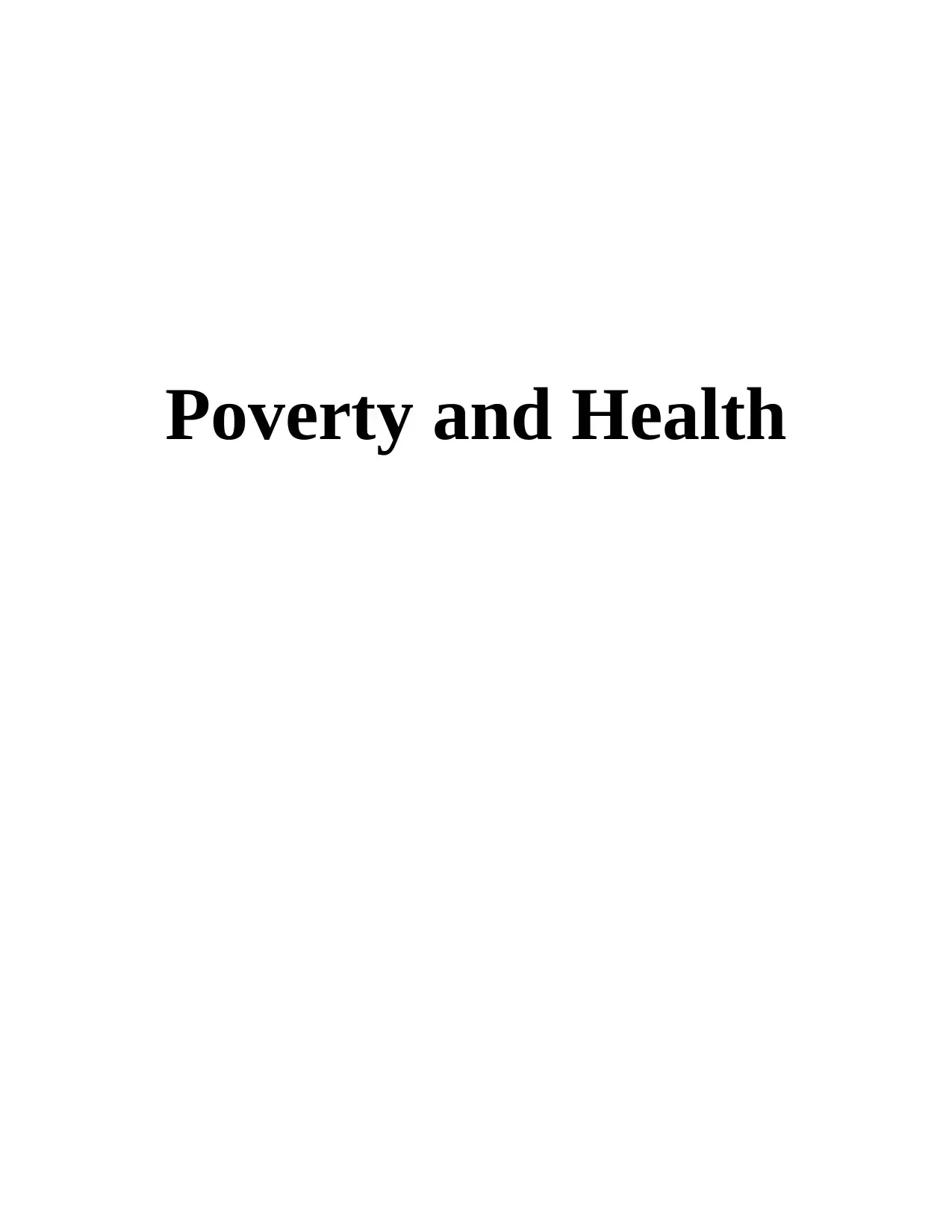
Poverty and Health
Secure Best Marks with AI Grader
Need help grading? Try our AI Grader for instant feedback on your assignments.
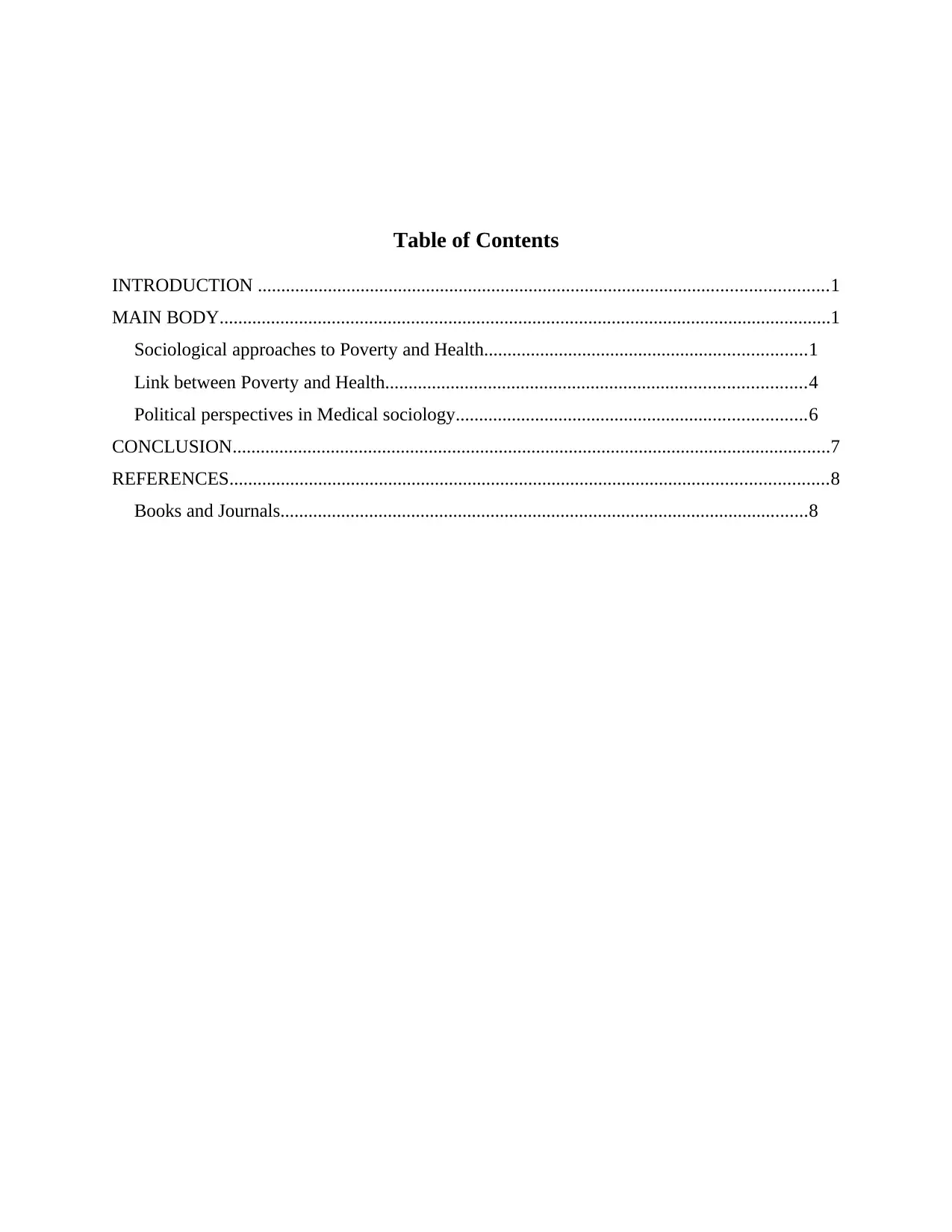
Table of Contents
INTRODUCTION ..........................................................................................................................1
MAIN BODY...................................................................................................................................1
Sociological approaches to Poverty and Health.....................................................................1
Link between Poverty and Health..........................................................................................4
Political perspectives in Medical sociology...........................................................................6
CONCLUSION................................................................................................................................7
REFERENCES................................................................................................................................8
Books and Journals.................................................................................................................8
INTRODUCTION ..........................................................................................................................1
MAIN BODY...................................................................................................................................1
Sociological approaches to Poverty and Health.....................................................................1
Link between Poverty and Health..........................................................................................4
Political perspectives in Medical sociology...........................................................................6
CONCLUSION................................................................................................................................7
REFERENCES................................................................................................................................8
Books and Journals.................................................................................................................8

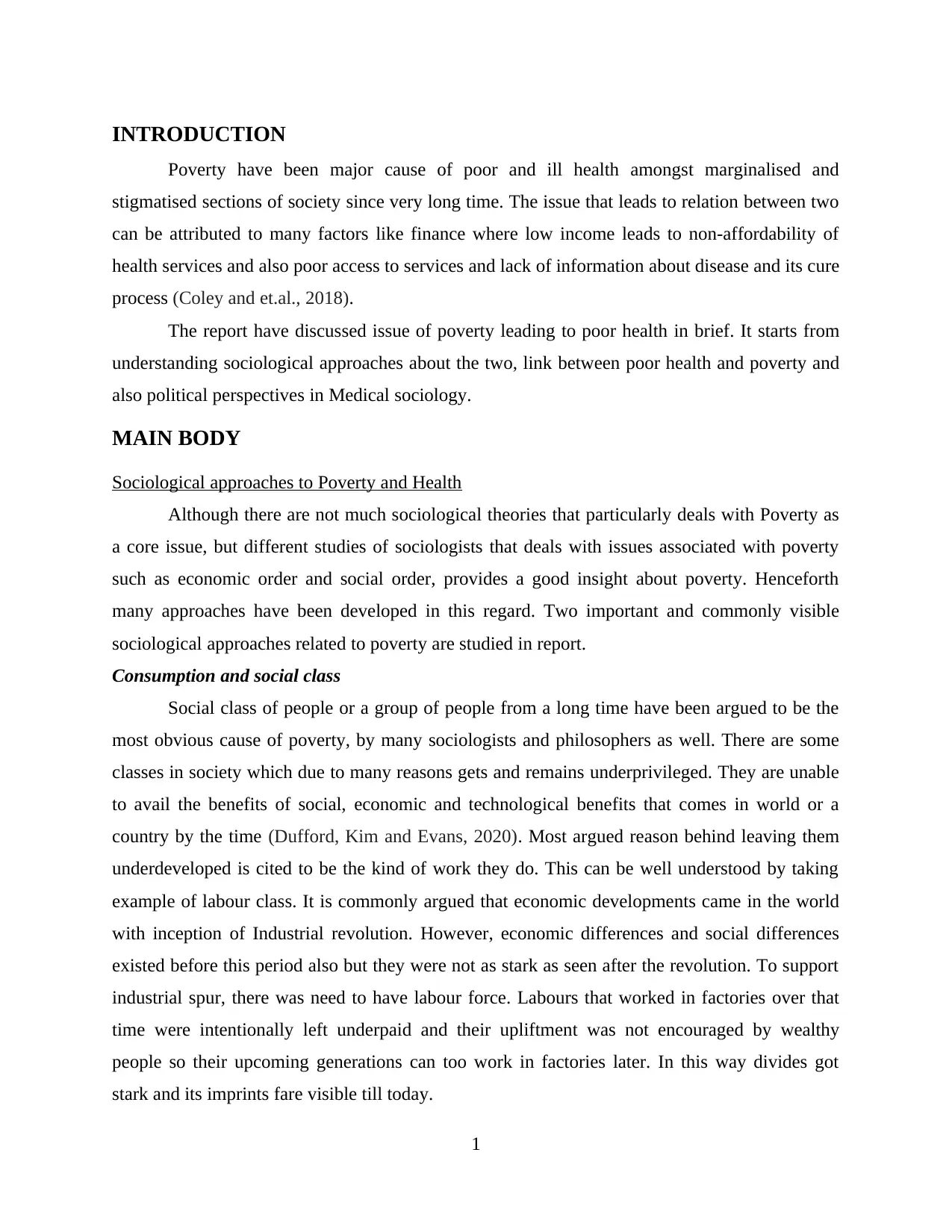
INTRODUCTION
Poverty have been major cause of poor and ill health amongst marginalised and
stigmatised sections of society since very long time. The issue that leads to relation between two
can be attributed to many factors like finance where low income leads to non-affordability of
health services and also poor access to services and lack of information about disease and its cure
process (Coley and et.al., 2018).
The report have discussed issue of poverty leading to poor health in brief. It starts from
understanding sociological approaches about the two, link between poor health and poverty and
also political perspectives in Medical sociology.
MAIN BODY
Sociological approaches to Poverty and Health
Although there are not much sociological theories that particularly deals with Poverty as
a core issue, but different studies of sociologists that deals with issues associated with poverty
such as economic order and social order, provides a good insight about poverty. Henceforth
many approaches have been developed in this regard. Two important and commonly visible
sociological approaches related to poverty are studied in report.
Consumption and social class
Social class of people or a group of people from a long time have been argued to be the
most obvious cause of poverty, by many sociologists and philosophers as well. There are some
classes in society which due to many reasons gets and remains underprivileged. They are unable
to avail the benefits of social, economic and technological benefits that comes in world or a
country by the time (Dufford, Kim and Evans, 2020). Most argued reason behind leaving them
underdeveloped is cited to be the kind of work they do. This can be well understood by taking
example of labour class. It is commonly argued that economic developments came in the world
with inception of Industrial revolution. However, economic differences and social differences
existed before this period also but they were not as stark as seen after the revolution. To support
industrial spur, there was need to have labour force. Labours that worked in factories over that
time were intentionally left underpaid and their upliftment was not encouraged by wealthy
people so their upcoming generations can too work in factories later. In this way divides got
stark and its imprints fare visible till today.
1
Poverty have been major cause of poor and ill health amongst marginalised and
stigmatised sections of society since very long time. The issue that leads to relation between two
can be attributed to many factors like finance where low income leads to non-affordability of
health services and also poor access to services and lack of information about disease and its cure
process (Coley and et.al., 2018).
The report have discussed issue of poverty leading to poor health in brief. It starts from
understanding sociological approaches about the two, link between poor health and poverty and
also political perspectives in Medical sociology.
MAIN BODY
Sociological approaches to Poverty and Health
Although there are not much sociological theories that particularly deals with Poverty as
a core issue, but different studies of sociologists that deals with issues associated with poverty
such as economic order and social order, provides a good insight about poverty. Henceforth
many approaches have been developed in this regard. Two important and commonly visible
sociological approaches related to poverty are studied in report.
Consumption and social class
Social class of people or a group of people from a long time have been argued to be the
most obvious cause of poverty, by many sociologists and philosophers as well. There are some
classes in society which due to many reasons gets and remains underprivileged. They are unable
to avail the benefits of social, economic and technological benefits that comes in world or a
country by the time (Dufford, Kim and Evans, 2020). Most argued reason behind leaving them
underdeveloped is cited to be the kind of work they do. This can be well understood by taking
example of labour class. It is commonly argued that economic developments came in the world
with inception of Industrial revolution. However, economic differences and social differences
existed before this period also but they were not as stark as seen after the revolution. To support
industrial spur, there was need to have labour force. Labours that worked in factories over that
time were intentionally left underpaid and their upliftment was not encouraged by wealthy
people so their upcoming generations can too work in factories later. In this way divides got
stark and its imprints fare visible till today.
1
Secure Best Marks with AI Grader
Need help grading? Try our AI Grader for instant feedback on your assignments.
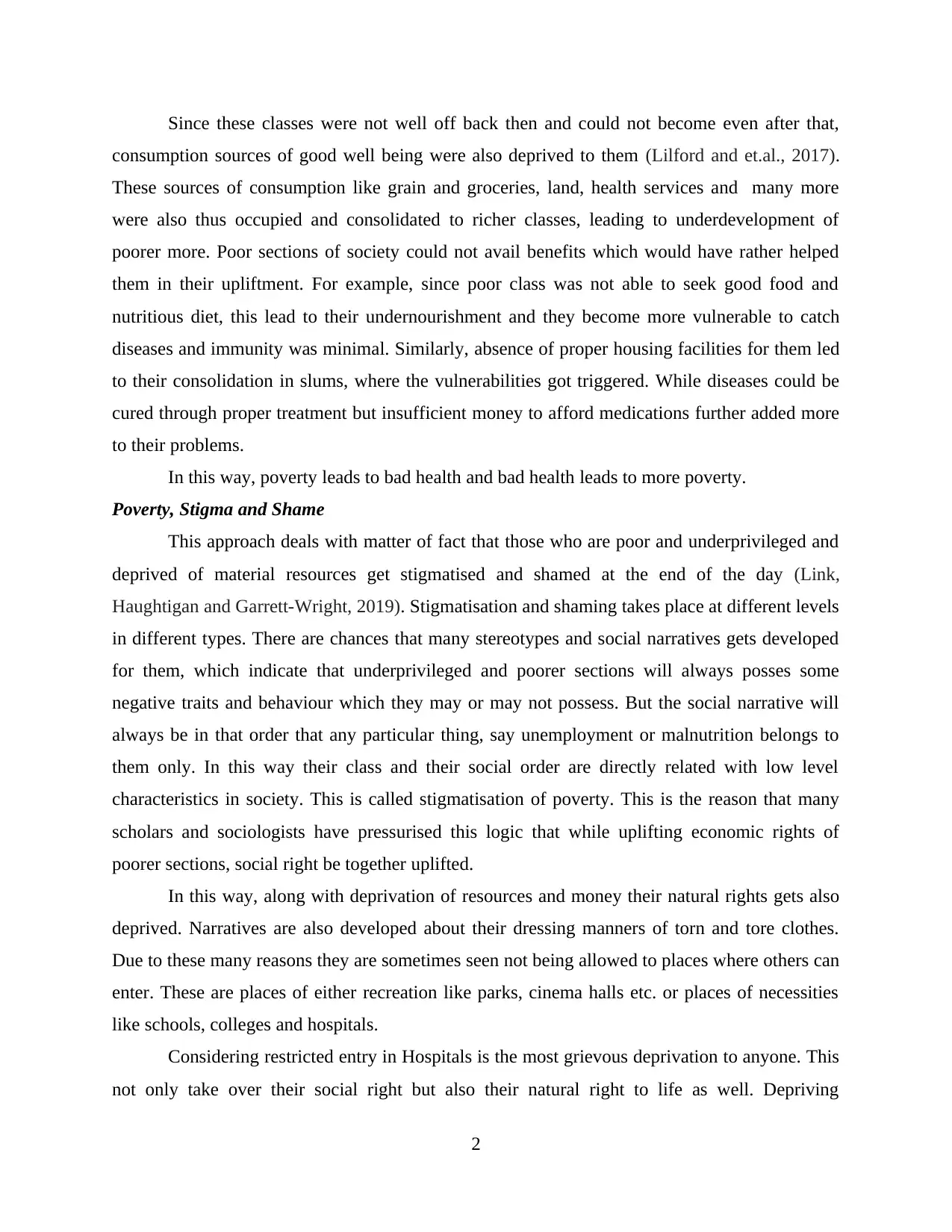
Since these classes were not well off back then and could not become even after that,
consumption sources of good well being were also deprived to them (Lilford and et.al., 2017).
These sources of consumption like grain and groceries, land, health services and many more
were also thus occupied and consolidated to richer classes, leading to underdevelopment of
poorer more. Poor sections of society could not avail benefits which would have rather helped
them in their upliftment. For example, since poor class was not able to seek good food and
nutritious diet, this lead to their undernourishment and they become more vulnerable to catch
diseases and immunity was minimal. Similarly, absence of proper housing facilities for them led
to their consolidation in slums, where the vulnerabilities got triggered. While diseases could be
cured through proper treatment but insufficient money to afford medications further added more
to their problems.
In this way, poverty leads to bad health and bad health leads to more poverty.
Poverty, Stigma and Shame
This approach deals with matter of fact that those who are poor and underprivileged and
deprived of material resources get stigmatised and shamed at the end of the day (Link,
Haughtigan and Garrett-Wright, 2019). Stigmatisation and shaming takes place at different levels
in different types. There are chances that many stereotypes and social narratives gets developed
for them, which indicate that underprivileged and poorer sections will always posses some
negative traits and behaviour which they may or may not possess. But the social narrative will
always be in that order that any particular thing, say unemployment or malnutrition belongs to
them only. In this way their class and their social order are directly related with low level
characteristics in society. This is called stigmatisation of poverty. This is the reason that many
scholars and sociologists have pressurised this logic that while uplifting economic rights of
poorer sections, social right be together uplifted.
In this way, along with deprivation of resources and money their natural rights gets also
deprived. Narratives are also developed about their dressing manners of torn and tore clothes.
Due to these many reasons they are sometimes seen not being allowed to places where others can
enter. These are places of either recreation like parks, cinema halls etc. or places of necessities
like schools, colleges and hospitals.
Considering restricted entry in Hospitals is the most grievous deprivation to anyone. This
not only take over their social right but also their natural right to life as well. Depriving
2
consumption sources of good well being were also deprived to them (Lilford and et.al., 2017).
These sources of consumption like grain and groceries, land, health services and many more
were also thus occupied and consolidated to richer classes, leading to underdevelopment of
poorer more. Poor sections of society could not avail benefits which would have rather helped
them in their upliftment. For example, since poor class was not able to seek good food and
nutritious diet, this lead to their undernourishment and they become more vulnerable to catch
diseases and immunity was minimal. Similarly, absence of proper housing facilities for them led
to their consolidation in slums, where the vulnerabilities got triggered. While diseases could be
cured through proper treatment but insufficient money to afford medications further added more
to their problems.
In this way, poverty leads to bad health and bad health leads to more poverty.
Poverty, Stigma and Shame
This approach deals with matter of fact that those who are poor and underprivileged and
deprived of material resources get stigmatised and shamed at the end of the day (Link,
Haughtigan and Garrett-Wright, 2019). Stigmatisation and shaming takes place at different levels
in different types. There are chances that many stereotypes and social narratives gets developed
for them, which indicate that underprivileged and poorer sections will always posses some
negative traits and behaviour which they may or may not possess. But the social narrative will
always be in that order that any particular thing, say unemployment or malnutrition belongs to
them only. In this way their class and their social order are directly related with low level
characteristics in society. This is called stigmatisation of poverty. This is the reason that many
scholars and sociologists have pressurised this logic that while uplifting economic rights of
poorer sections, social right be together uplifted.
In this way, along with deprivation of resources and money their natural rights gets also
deprived. Narratives are also developed about their dressing manners of torn and tore clothes.
Due to these many reasons they are sometimes seen not being allowed to places where others can
enter. These are places of either recreation like parks, cinema halls etc. or places of necessities
like schools, colleges and hospitals.
Considering restricted entry in Hospitals is the most grievous deprivation to anyone. This
not only take over their social right but also their natural right to life as well. Depriving
2
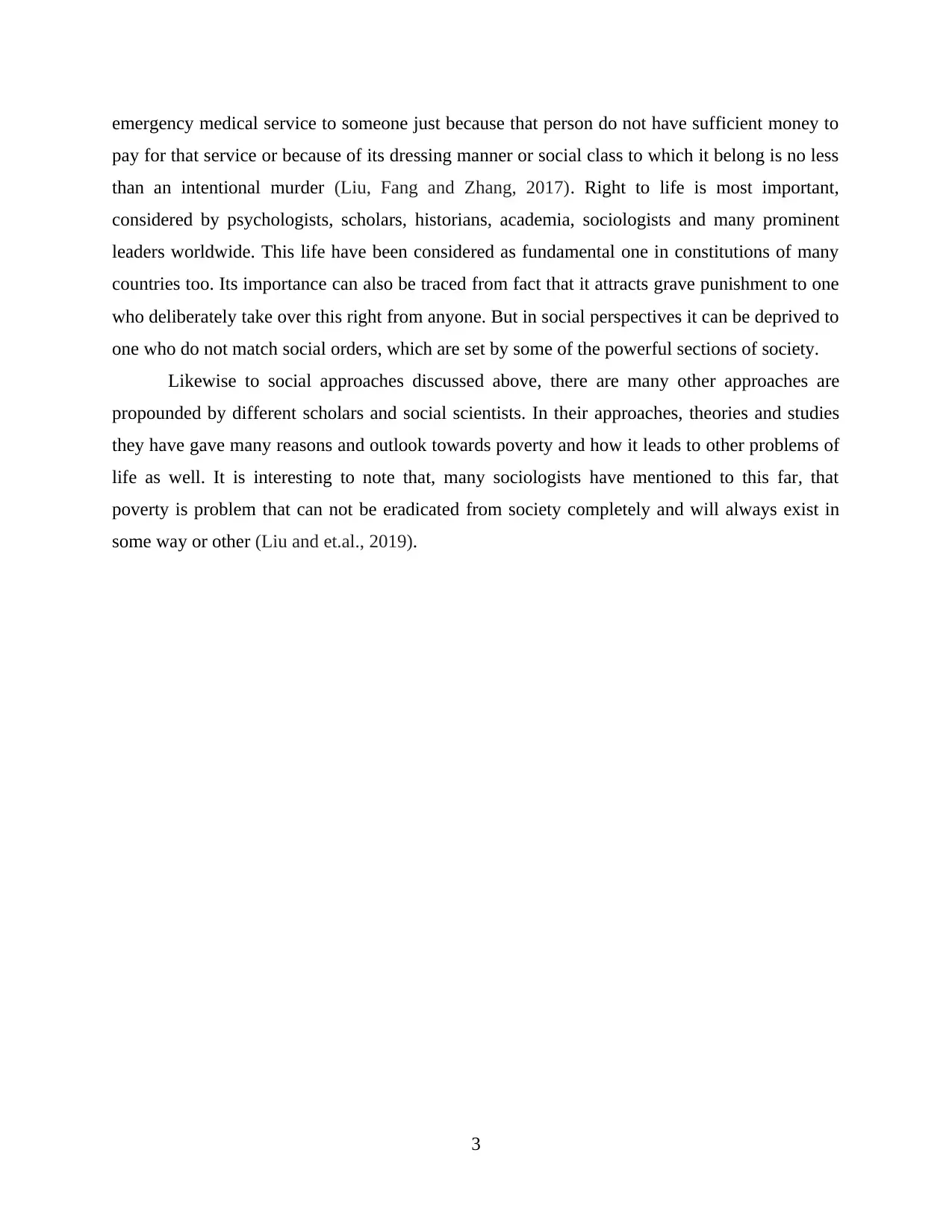
emergency medical service to someone just because that person do not have sufficient money to
pay for that service or because of its dressing manner or social class to which it belong is no less
than an intentional murder (Liu, Fang and Zhang, 2017). Right to life is most important,
considered by psychologists, scholars, historians, academia, sociologists and many prominent
leaders worldwide. This life have been considered as fundamental one in constitutions of many
countries too. Its importance can also be traced from fact that it attracts grave punishment to one
who deliberately take over this right from anyone. But in social perspectives it can be deprived to
one who do not match social orders, which are set by some of the powerful sections of society.
Likewise to social approaches discussed above, there are many other approaches are
propounded by different scholars and social scientists. In their approaches, theories and studies
they have gave many reasons and outlook towards poverty and how it leads to other problems of
life as well. It is interesting to note that, many sociologists have mentioned to this far, that
poverty is problem that can not be eradicated from society completely and will always exist in
some way or other (Liu and et.al., 2019).
3
pay for that service or because of its dressing manner or social class to which it belong is no less
than an intentional murder (Liu, Fang and Zhang, 2017). Right to life is most important,
considered by psychologists, scholars, historians, academia, sociologists and many prominent
leaders worldwide. This life have been considered as fundamental one in constitutions of many
countries too. Its importance can also be traced from fact that it attracts grave punishment to one
who deliberately take over this right from anyone. But in social perspectives it can be deprived to
one who do not match social orders, which are set by some of the powerful sections of society.
Likewise to social approaches discussed above, there are many other approaches are
propounded by different scholars and social scientists. In their approaches, theories and studies
they have gave many reasons and outlook towards poverty and how it leads to other problems of
life as well. It is interesting to note that, many sociologists have mentioned to this far, that
poverty is problem that can not be eradicated from society completely and will always exist in
some way or other (Liu and et.al., 2019).
3
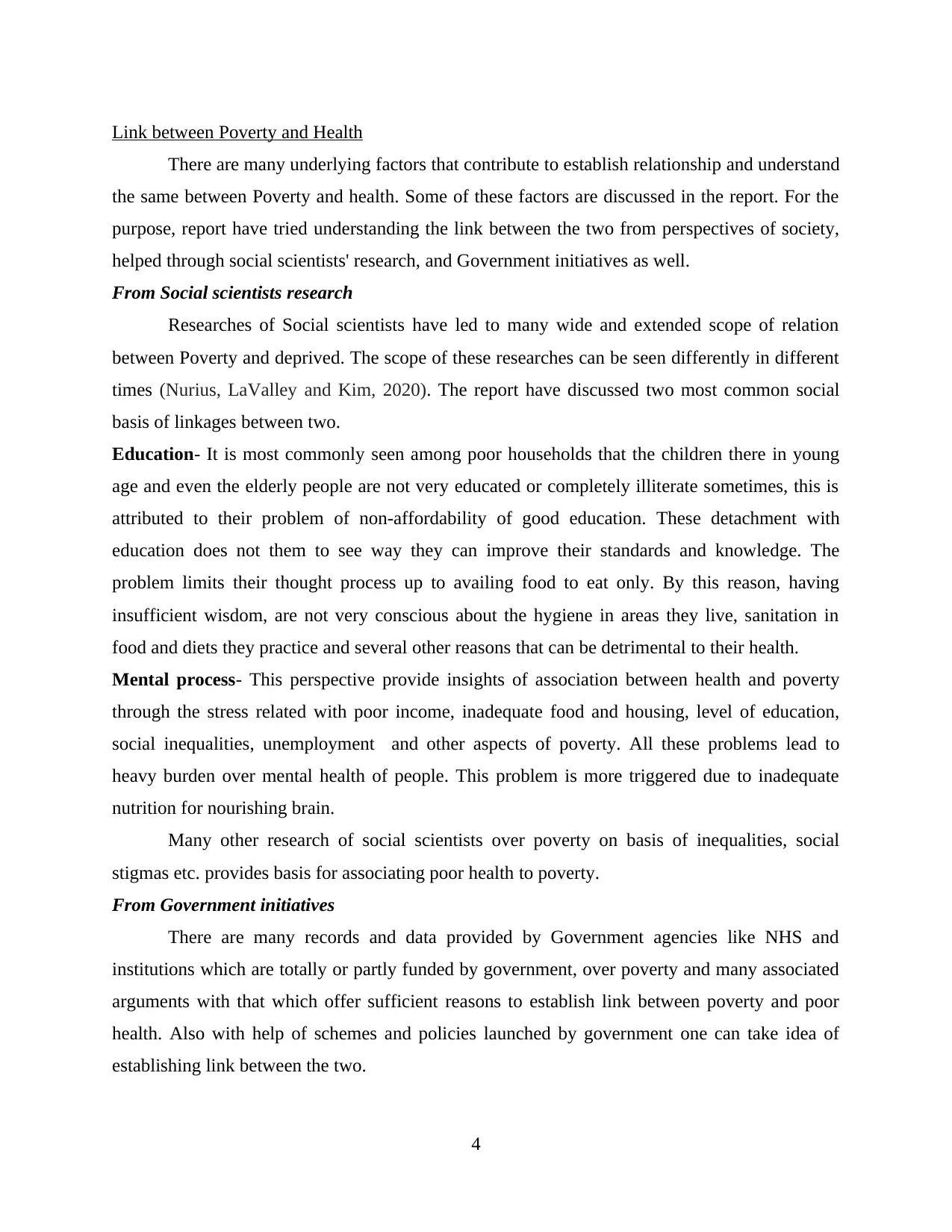
Link between Poverty and Health
There are many underlying factors that contribute to establish relationship and understand
the same between Poverty and health. Some of these factors are discussed in the report. For the
purpose, report have tried understanding the link between the two from perspectives of society,
helped through social scientists' research, and Government initiatives as well.
From Social scientists research
Researches of Social scientists have led to many wide and extended scope of relation
between Poverty and deprived. The scope of these researches can be seen differently in different
times (Nurius, LaValley and Kim, 2020). The report have discussed two most common social
basis of linkages between two.
Education- It is most commonly seen among poor households that the children there in young
age and even the elderly people are not very educated or completely illiterate sometimes, this is
attributed to their problem of non-affordability of good education. These detachment with
education does not them to see way they can improve their standards and knowledge. The
problem limits their thought process up to availing food to eat only. By this reason, having
insufficient wisdom, are not very conscious about the hygiene in areas they live, sanitation in
food and diets they practice and several other reasons that can be detrimental to their health.
Mental process- This perspective provide insights of association between health and poverty
through the stress related with poor income, inadequate food and housing, level of education,
social inequalities, unemployment and other aspects of poverty. All these problems lead to
heavy burden over mental health of people. This problem is more triggered due to inadequate
nutrition for nourishing brain.
Many other research of social scientists over poverty on basis of inequalities, social
stigmas etc. provides basis for associating poor health to poverty.
From Government initiatives
There are many records and data provided by Government agencies like NHS and
institutions which are totally or partly funded by government, over poverty and many associated
arguments with that which offer sufficient reasons to establish link between poverty and poor
health. Also with help of schemes and policies launched by government one can take idea of
establishing link between the two.
4
There are many underlying factors that contribute to establish relationship and understand
the same between Poverty and health. Some of these factors are discussed in the report. For the
purpose, report have tried understanding the link between the two from perspectives of society,
helped through social scientists' research, and Government initiatives as well.
From Social scientists research
Researches of Social scientists have led to many wide and extended scope of relation
between Poverty and deprived. The scope of these researches can be seen differently in different
times (Nurius, LaValley and Kim, 2020). The report have discussed two most common social
basis of linkages between two.
Education- It is most commonly seen among poor households that the children there in young
age and even the elderly people are not very educated or completely illiterate sometimes, this is
attributed to their problem of non-affordability of good education. These detachment with
education does not them to see way they can improve their standards and knowledge. The
problem limits their thought process up to availing food to eat only. By this reason, having
insufficient wisdom, are not very conscious about the hygiene in areas they live, sanitation in
food and diets they practice and several other reasons that can be detrimental to their health.
Mental process- This perspective provide insights of association between health and poverty
through the stress related with poor income, inadequate food and housing, level of education,
social inequalities, unemployment and other aspects of poverty. All these problems lead to
heavy burden over mental health of people. This problem is more triggered due to inadequate
nutrition for nourishing brain.
Many other research of social scientists over poverty on basis of inequalities, social
stigmas etc. provides basis for associating poor health to poverty.
From Government initiatives
There are many records and data provided by Government agencies like NHS and
institutions which are totally or partly funded by government, over poverty and many associated
arguments with that which offer sufficient reasons to establish link between poverty and poor
health. Also with help of schemes and policies launched by government one can take idea of
establishing link between the two.
4
Paraphrase This Document
Need a fresh take? Get an instant paraphrase of this document with our AI Paraphraser
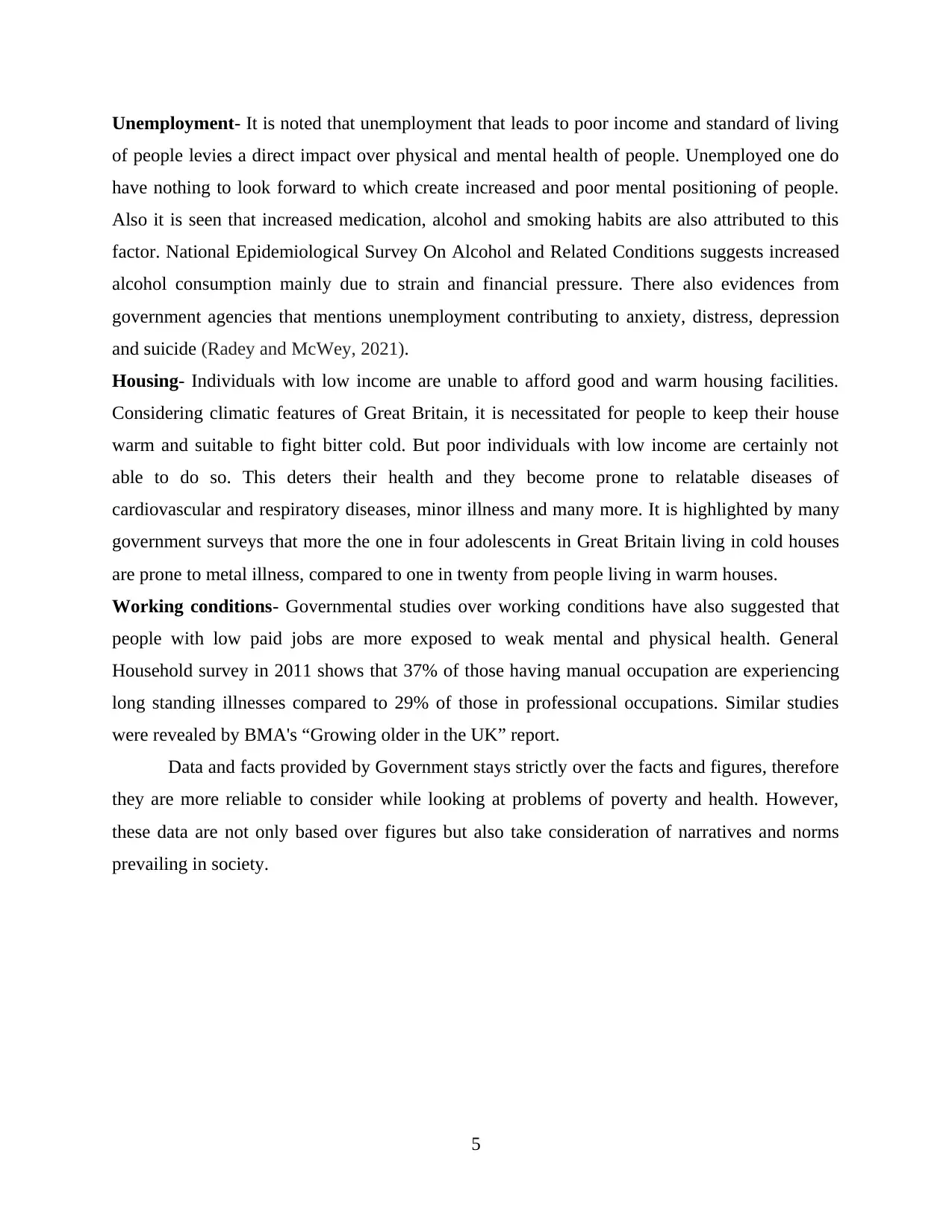
Unemployment- It is noted that unemployment that leads to poor income and standard of living
of people levies a direct impact over physical and mental health of people. Unemployed one do
have nothing to look forward to which create increased and poor mental positioning of people.
Also it is seen that increased medication, alcohol and smoking habits are also attributed to this
factor. National Epidemiological Survey On Alcohol and Related Conditions suggests increased
alcohol consumption mainly due to strain and financial pressure. There also evidences from
government agencies that mentions unemployment contributing to anxiety, distress, depression
and suicide (Radey and McWey, 2021).
Housing- Individuals with low income are unable to afford good and warm housing facilities.
Considering climatic features of Great Britain, it is necessitated for people to keep their house
warm and suitable to fight bitter cold. But poor individuals with low income are certainly not
able to do so. This deters their health and they become prone to relatable diseases of
cardiovascular and respiratory diseases, minor illness and many more. It is highlighted by many
government surveys that more the one in four adolescents in Great Britain living in cold houses
are prone to metal illness, compared to one in twenty from people living in warm houses.
Working conditions- Governmental studies over working conditions have also suggested that
people with low paid jobs are more exposed to weak mental and physical health. General
Household survey in 2011 shows that 37% of those having manual occupation are experiencing
long standing illnesses compared to 29% of those in professional occupations. Similar studies
were revealed by BMA's “Growing older in the UK” report.
Data and facts provided by Government stays strictly over the facts and figures, therefore
they are more reliable to consider while looking at problems of poverty and health. However,
these data are not only based over figures but also take consideration of narratives and norms
prevailing in society.
5
of people levies a direct impact over physical and mental health of people. Unemployed one do
have nothing to look forward to which create increased and poor mental positioning of people.
Also it is seen that increased medication, alcohol and smoking habits are also attributed to this
factor. National Epidemiological Survey On Alcohol and Related Conditions suggests increased
alcohol consumption mainly due to strain and financial pressure. There also evidences from
government agencies that mentions unemployment contributing to anxiety, distress, depression
and suicide (Radey and McWey, 2021).
Housing- Individuals with low income are unable to afford good and warm housing facilities.
Considering climatic features of Great Britain, it is necessitated for people to keep their house
warm and suitable to fight bitter cold. But poor individuals with low income are certainly not
able to do so. This deters their health and they become prone to relatable diseases of
cardiovascular and respiratory diseases, minor illness and many more. It is highlighted by many
government surveys that more the one in four adolescents in Great Britain living in cold houses
are prone to metal illness, compared to one in twenty from people living in warm houses.
Working conditions- Governmental studies over working conditions have also suggested that
people with low paid jobs are more exposed to weak mental and physical health. General
Household survey in 2011 shows that 37% of those having manual occupation are experiencing
long standing illnesses compared to 29% of those in professional occupations. Similar studies
were revealed by BMA's “Growing older in the UK” report.
Data and facts provided by Government stays strictly over the facts and figures, therefore
they are more reliable to consider while looking at problems of poverty and health. However,
these data are not only based over figures but also take consideration of narratives and norms
prevailing in society.
5
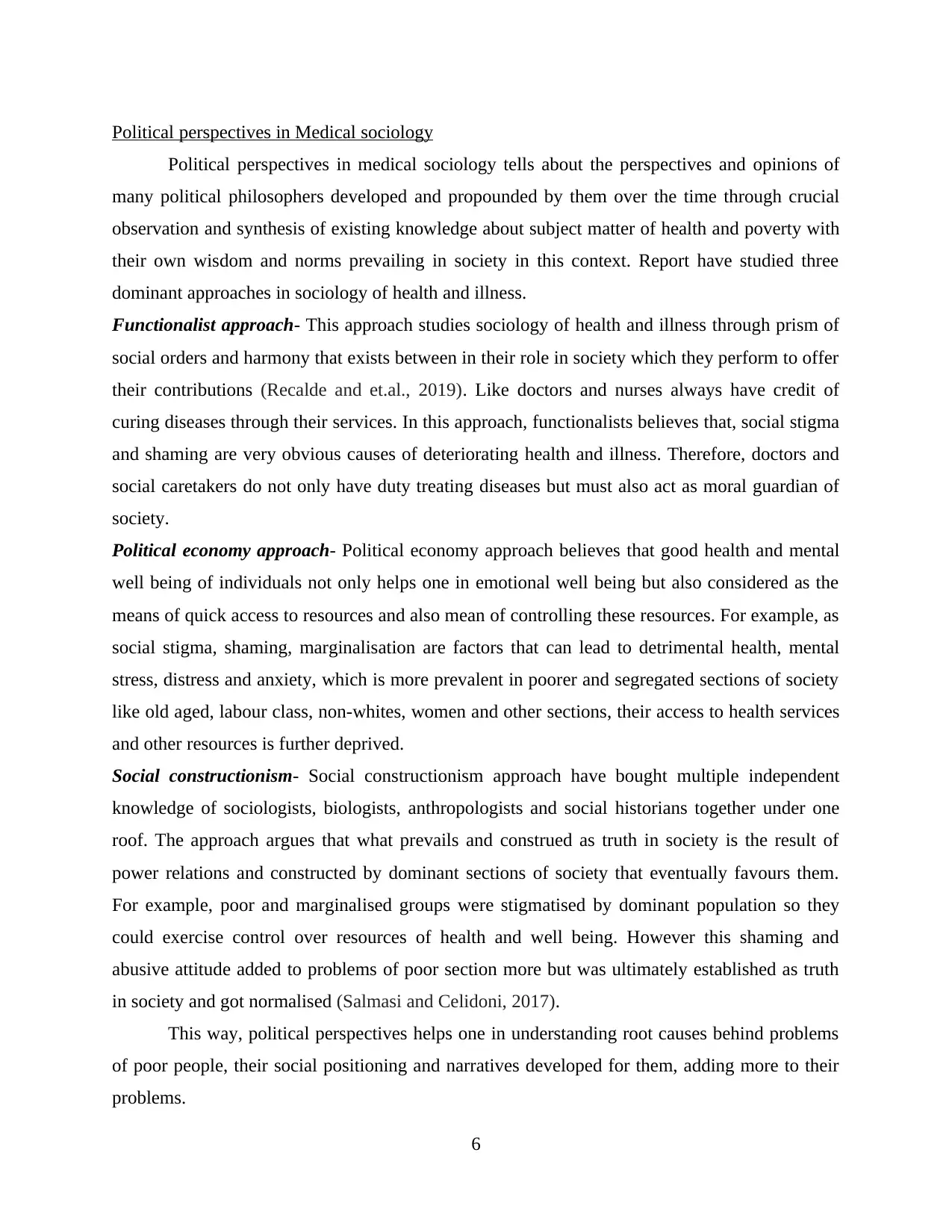
Political perspectives in Medical sociology
Political perspectives in medical sociology tells about the perspectives and opinions of
many political philosophers developed and propounded by them over the time through crucial
observation and synthesis of existing knowledge about subject matter of health and poverty with
their own wisdom and norms prevailing in society in this context. Report have studied three
dominant approaches in sociology of health and illness.
Functionalist approach- This approach studies sociology of health and illness through prism of
social orders and harmony that exists between in their role in society which they perform to offer
their contributions (Recalde and et.al., 2019). Like doctors and nurses always have credit of
curing diseases through their services. In this approach, functionalists believes that, social stigma
and shaming are very obvious causes of deteriorating health and illness. Therefore, doctors and
social caretakers do not only have duty treating diseases but must also act as moral guardian of
society.
Political economy approach- Political economy approach believes that good health and mental
well being of individuals not only helps one in emotional well being but also considered as the
means of quick access to resources and also mean of controlling these resources. For example, as
social stigma, shaming, marginalisation are factors that can lead to detrimental health, mental
stress, distress and anxiety, which is more prevalent in poorer and segregated sections of society
like old aged, labour class, non-whites, women and other sections, their access to health services
and other resources is further deprived.
Social constructionism- Social constructionism approach have bought multiple independent
knowledge of sociologists, biologists, anthropologists and social historians together under one
roof. The approach argues that what prevails and construed as truth in society is the result of
power relations and constructed by dominant sections of society that eventually favours them.
For example, poor and marginalised groups were stigmatised by dominant population so they
could exercise control over resources of health and well being. However this shaming and
abusive attitude added to problems of poor section more but was ultimately established as truth
in society and got normalised (Salmasi and Celidoni, 2017).
This way, political perspectives helps one in understanding root causes behind problems
of poor people, their social positioning and narratives developed for them, adding more to their
problems.
6
Political perspectives in medical sociology tells about the perspectives and opinions of
many political philosophers developed and propounded by them over the time through crucial
observation and synthesis of existing knowledge about subject matter of health and poverty with
their own wisdom and norms prevailing in society in this context. Report have studied three
dominant approaches in sociology of health and illness.
Functionalist approach- This approach studies sociology of health and illness through prism of
social orders and harmony that exists between in their role in society which they perform to offer
their contributions (Recalde and et.al., 2019). Like doctors and nurses always have credit of
curing diseases through their services. In this approach, functionalists believes that, social stigma
and shaming are very obvious causes of deteriorating health and illness. Therefore, doctors and
social caretakers do not only have duty treating diseases but must also act as moral guardian of
society.
Political economy approach- Political economy approach believes that good health and mental
well being of individuals not only helps one in emotional well being but also considered as the
means of quick access to resources and also mean of controlling these resources. For example, as
social stigma, shaming, marginalisation are factors that can lead to detrimental health, mental
stress, distress and anxiety, which is more prevalent in poorer and segregated sections of society
like old aged, labour class, non-whites, women and other sections, their access to health services
and other resources is further deprived.
Social constructionism- Social constructionism approach have bought multiple independent
knowledge of sociologists, biologists, anthropologists and social historians together under one
roof. The approach argues that what prevails and construed as truth in society is the result of
power relations and constructed by dominant sections of society that eventually favours them.
For example, poor and marginalised groups were stigmatised by dominant population so they
could exercise control over resources of health and well being. However this shaming and
abusive attitude added to problems of poor section more but was ultimately established as truth
in society and got normalised (Salmasi and Celidoni, 2017).
This way, political perspectives helps one in understanding root causes behind problems
of poor people, their social positioning and narratives developed for them, adding more to their
problems.
6
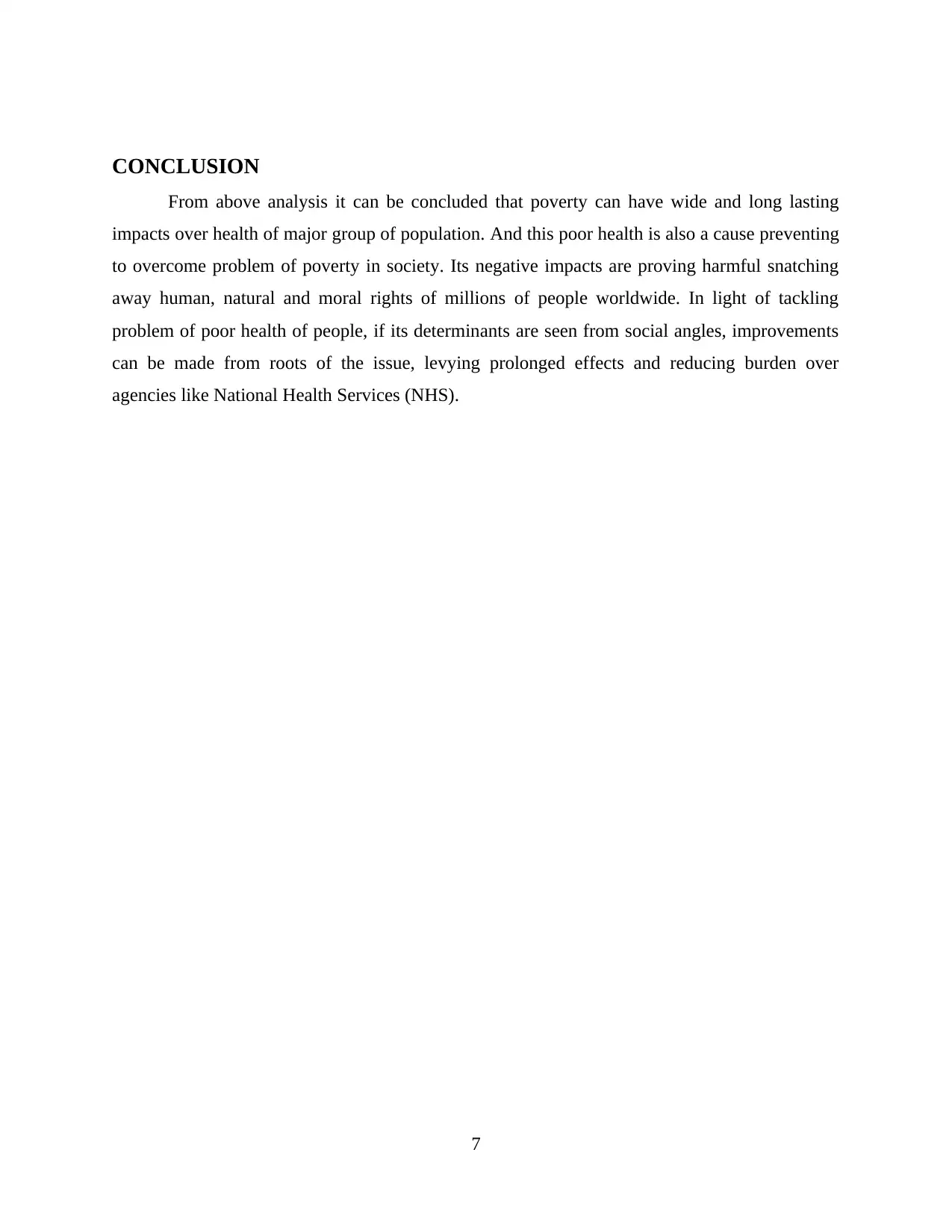
CONCLUSION
From above analysis it can be concluded that poverty can have wide and long lasting
impacts over health of major group of population. And this poor health is also a cause preventing
to overcome problem of poverty in society. Its negative impacts are proving harmful snatching
away human, natural and moral rights of millions of people worldwide. In light of tackling
problem of poor health of people, if its determinants are seen from social angles, improvements
can be made from roots of the issue, levying prolonged effects and reducing burden over
agencies like National Health Services (NHS).
7
From above analysis it can be concluded that poverty can have wide and long lasting
impacts over health of major group of population. And this poor health is also a cause preventing
to overcome problem of poverty in society. Its negative impacts are proving harmful snatching
away human, natural and moral rights of millions of people worldwide. In light of tackling
problem of poor health of people, if its determinants are seen from social angles, improvements
can be made from roots of the issue, levying prolonged effects and reducing burden over
agencies like National Health Services (NHS).
7
Secure Best Marks with AI Grader
Need help grading? Try our AI Grader for instant feedback on your assignments.
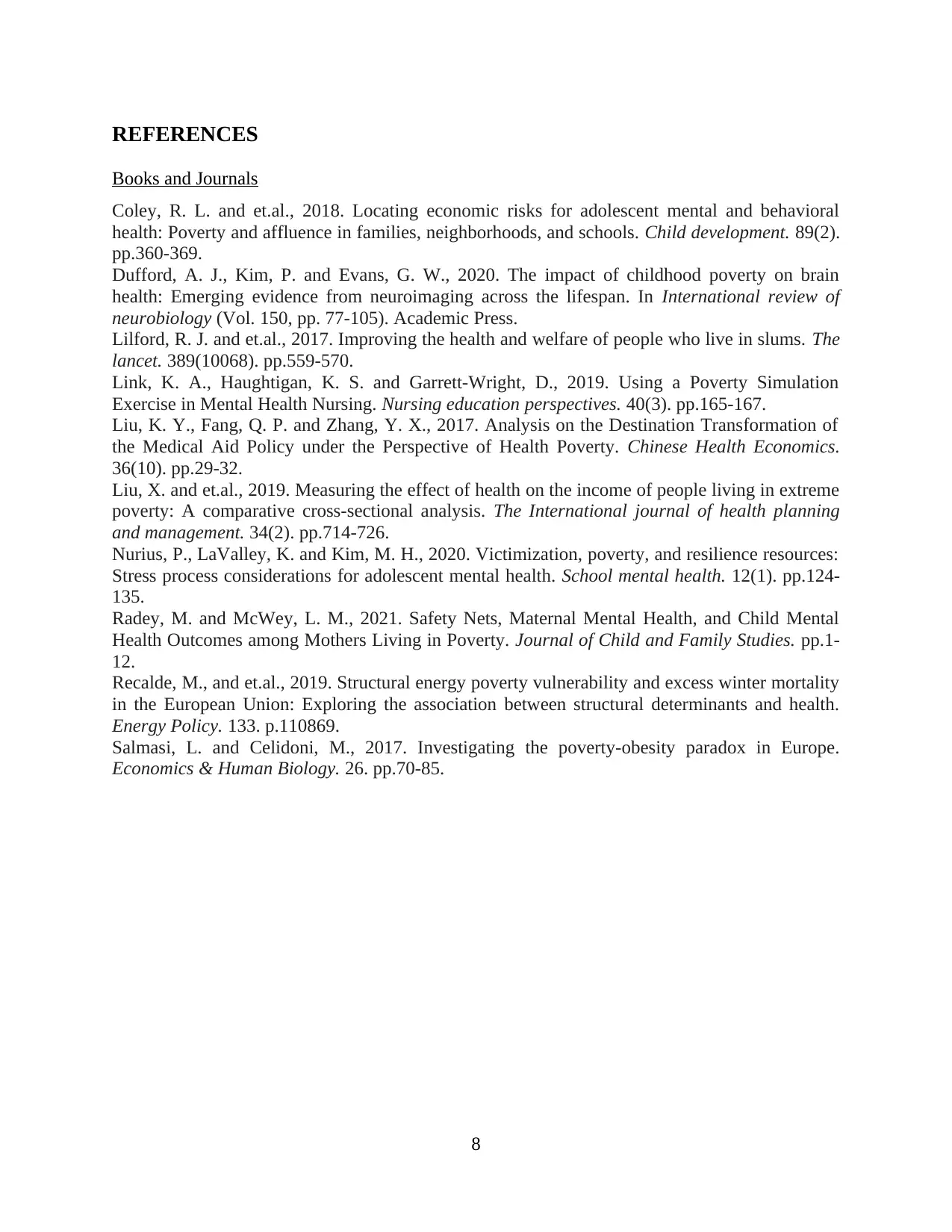
REFERENCES
Books and Journals
Coley, R. L. and et.al., 2018. Locating economic risks for adolescent mental and behavioral
health: Poverty and affluence in families, neighborhoods, and schools. Child development. 89(2).
pp.360-369.
Dufford, A. J., Kim, P. and Evans, G. W., 2020. The impact of childhood poverty on brain
health: Emerging evidence from neuroimaging across the lifespan. In International review of
neurobiology (Vol. 150, pp. 77-105). Academic Press.
Lilford, R. J. and et.al., 2017. Improving the health and welfare of people who live in slums. The
lancet. 389(10068). pp.559-570.
Link, K. A., Haughtigan, K. S. and Garrett-Wright, D., 2019. Using a Poverty Simulation
Exercise in Mental Health Nursing. Nursing education perspectives. 40(3). pp.165-167.
Liu, K. Y., Fang, Q. P. and Zhang, Y. X., 2017. Analysis on the Destination Transformation of
the Medical Aid Policy under the Perspective of Health Poverty. Chinese Health Economics.
36(10). pp.29-32.
Liu, X. and et.al., 2019. Measuring the effect of health on the income of people living in extreme
poverty: A comparative cross‐sectional analysis. The International journal of health planning
and management. 34(2). pp.714-726.
Nurius, P., LaValley, K. and Kim, M. H., 2020. Victimization, poverty, and resilience resources:
Stress process considerations for adolescent mental health. School mental health. 12(1). pp.124-
135.
Radey, M. and McWey, L. M., 2021. Safety Nets, Maternal Mental Health, and Child Mental
Health Outcomes among Mothers Living in Poverty. Journal of Child and Family Studies. pp.1-
12.
Recalde, M., and et.al., 2019. Structural energy poverty vulnerability and excess winter mortality
in the European Union: Exploring the association between structural determinants and health.
Energy Policy. 133. p.110869.
Salmasi, L. and Celidoni, M., 2017. Investigating the poverty-obesity paradox in Europe.
Economics & Human Biology. 26. pp.70-85.
8
Books and Journals
Coley, R. L. and et.al., 2018. Locating economic risks for adolescent mental and behavioral
health: Poverty and affluence in families, neighborhoods, and schools. Child development. 89(2).
pp.360-369.
Dufford, A. J., Kim, P. and Evans, G. W., 2020. The impact of childhood poverty on brain
health: Emerging evidence from neuroimaging across the lifespan. In International review of
neurobiology (Vol. 150, pp. 77-105). Academic Press.
Lilford, R. J. and et.al., 2017. Improving the health and welfare of people who live in slums. The
lancet. 389(10068). pp.559-570.
Link, K. A., Haughtigan, K. S. and Garrett-Wright, D., 2019. Using a Poverty Simulation
Exercise in Mental Health Nursing. Nursing education perspectives. 40(3). pp.165-167.
Liu, K. Y., Fang, Q. P. and Zhang, Y. X., 2017. Analysis on the Destination Transformation of
the Medical Aid Policy under the Perspective of Health Poverty. Chinese Health Economics.
36(10). pp.29-32.
Liu, X. and et.al., 2019. Measuring the effect of health on the income of people living in extreme
poverty: A comparative cross‐sectional analysis. The International journal of health planning
and management. 34(2). pp.714-726.
Nurius, P., LaValley, K. and Kim, M. H., 2020. Victimization, poverty, and resilience resources:
Stress process considerations for adolescent mental health. School mental health. 12(1). pp.124-
135.
Radey, M. and McWey, L. M., 2021. Safety Nets, Maternal Mental Health, and Child Mental
Health Outcomes among Mothers Living in Poverty. Journal of Child and Family Studies. pp.1-
12.
Recalde, M., and et.al., 2019. Structural energy poverty vulnerability and excess winter mortality
in the European Union: Exploring the association between structural determinants and health.
Energy Policy. 133. p.110869.
Salmasi, L. and Celidoni, M., 2017. Investigating the poverty-obesity paradox in Europe.
Economics & Human Biology. 26. pp.70-85.
8
1 out of 11
Related Documents
Your All-in-One AI-Powered Toolkit for Academic Success.
+13062052269
info@desklib.com
Available 24*7 on WhatsApp / Email
![[object Object]](/_next/static/media/star-bottom.7253800d.svg)
Unlock your academic potential
© 2024 | Zucol Services PVT LTD | All rights reserved.




